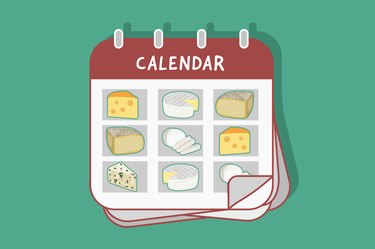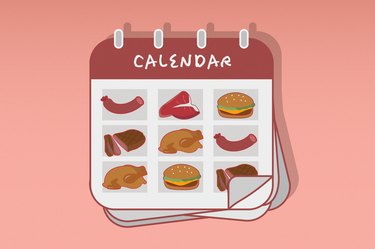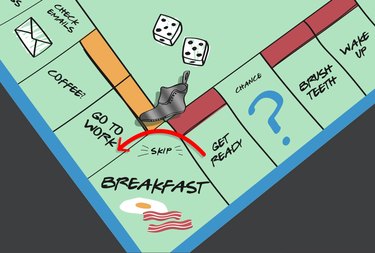
Nutty Gouda, creamy mozzarella, sharp Provolone... there are few things that are as tasty and satisfying as cheese. Even just a little goes a long way: Grating some Parmesan on a pile of kale, for instance, can make your greens more palatable, ahem, more edible.
So you may be wondering, Is it OK to eat cheese daily? Dietitian Bonnie Taub-Dix, RDN, CDN and author of Read It Before You Eat It — Taking You From Label to Table, says it ultimately comes down to three things:
Video of the Day
Video of the Day
- the type of cheese
- how much you're enjoying daily
- if you live with certain health conditions
For example, if you have lactose intolerance, then you don't want to eat too much cheese, especially types high in lactose. And if you live with heart disease, consider part-skim cheese or those lower in sodium and fat content, Taub-Dix says.
"Cheese is an excellent source of protein, as well as vitamins and minerals. Therefore, cheese can and should be consumed in moderation as part of a balanced diet," says Mary Matone, RD, a dietitian at Culina Health.
Here are all of the benefits and drawbacks of cheese you stand to get each time you add a tablespoon or slice to your meals.
The Benefits of Eating Cheese Daily
You'll Get More Protein
Just one serving (about an ounce) of cheese can have up to 10 grams of protein or more, but most cheeses have somewhere between 5 and 7 grams of protein per serving, Matone says. For perspective, one egg has about 6 grams of protein, so adding cheese to your dishes can help you increase your daily protein intake.
"Protein is the most satiating macronutrient, meaning meals that contain protein will likely keep you full for longer periods of time than foods that do not contain protein," Matone says.
Instead of reaching for the collagen powder post-workout, consider re-fueling with a bowl of cottage cheese and fruit. Protein is not only essential for satisfying hunger and stabilizing blood sugar levels, but it's also important for building and maintaining lean muscle.
The recommended daily allowance (RDA) for protein is 0.8 grams of protein per kilogram of body weight, according to Harvard Health Publishing. So a person weighing 155 pounds (70-kilogram) would need to eat 56 grams of protein each day.
You'll Load Up on Calcium
One slice of cheese has around 150 to 300 milligrams of calcium, and most people generally need to have about 700 to 1,200 milligrams of the bone-building nutrient daily so that makes a good dent for just one slice, Taub-Dix says.
For example, adults between 19 and 50 years old need 1,000 milligrams of calcium daily, according to the National Institutes of Health (NIH).
"Soft cheeses like cream cheese and brie contain 2 to 5 percent of the RDA while Parmesan contains approximately 30 percent of the RDA. Other cheeses fall between these amounts," Matone says.
Postmenopausal people, in particular, experience greater bone loss because of the drop in estrogen levels (estrogen helps prevent the weakening of bone), so they need to make sure they get enough calcium from their diet — or through supplements, if needed, per the NIH.
"While calcium is best known for its positive impact on both strength, it is also important for muscle contraction and cardiovascular health, particularly lowering blood pressure and possibly even lowering cholesterol," Matone explains.
It Provides Vitamins, Minerals and Probiotics
It turns out that chasing that cheddar can also provide you with some important vitamins and nutrients, like vitamins A, K, D and B12, as well as zinc, Taub-Dix says.
"Cheese contains appreciable amounts of vitamin A, which is not only important for eye health but also has antioxidant properties. Cheese also contains a good amount of vitamin B12 — a key nutrient for nervous system function and DNA production — and phosphorous, which aids in bone growth, muscle recovery and DNA production," Matone says.
Just like yogurt and fermented foods, some cheeses also have probiotics. Cheeses that have been aged but not heated afterward, such as Swiss, provolone, Gouda, cheddar, Edam, Gruyere and cottage cheese, have these gut health-promoting bacteria, according to Harvard Health Publishing.
It's Portable and Versatile
If you're on the go, you can easily pack a cheese sandwich or some cheese, crackers and fruit and veggies in a reusable container or snack bag.
"You can put them in a lunch bag with a cold pack and take it along with you. Cheese is very portable and easy to eat," Taub-Dix says.
It Might Be OK if You Have Lactose Intolerance
If you have lactose intolerance, you may be able to tolerate cheeses that contain less lactose. Hard cheeses, such as Swiss, Parmesan, and cheddar, are generally great low-lactose options, Matone says.
"In addition, goat milk cheese and buffalo mozzarella may contain less lactose compared with cheese made from cow's milk," she says. "Goat milk cheese contains different casein proteins compared with cow's milk cheese, which is thought to potentially impact digestion as well."
So if you're someone who's sensitive to dairy or has lactose intolerance, you may find it easier to digest hard cheeses, goat cheese and buffalo cheese than soft cow's cheese.
The Drawbacks of Eating Cheese Daily
You Might Eat Too Much Sodium
A slice or serving of cheese can have up to 450 milligrams of sodium, Taub-Dix says. "One slice isn't a tragedy, but it can be if you add several slices."
Plus, some cheeses have more sodium than others. For example, Parmesan, feta and Romano are higher in sodium compared to mozzarella and Swiss, Matone says.
According to the Dietary Guidelines for Americans, adults should limit their sodium intake to less than 2,300 milligrams daily, so that's about a teaspoon of table salt. Meanwhile, the American Heart Association (AHA) says the ideal limit for those with high blood pressure is 1,500 milligrams per day.
"While higher-sodium cheeses can be consumed by most people in moderation, anyone following a low-sodium diet may be unable to consume salty cheeses as part of their balanced diet. But low-sodium cheeses make it possible for even those on a low-sodium diet to enjoy cheese now and again," Matone says.
To help you choose lower-sodium options, read the nutrition label. This will give you information about the cheese and how much sodium it has. "A surprise might be that cottage cheese is higher in sodium, but it's also high in protein," Taub-Dix says.
You Might Get Too Much Saturated Fat
"If you eat a lot more than an ounce of cheese, three or four times the amount of saturated fat is a lot," Taub-Dix says, so you want to be mindful about how much you're enjoying.
A diet high in saturated fat is associated with heart disease, so the AHA recommends limiting your daily saturated fat intake to no more than 5 to 6 percent of your calories.
That said, "recent research suggests that the positive nutrition implications of cheese may outweigh — or at least neutralize — the negatives associated with cheese's high-fat content," Matone says.
Full-fat dairy products, such as yogurt, kefir and cheese — particularly their nutrients and anti-inflammatory properties — may have a positive or neutral effect on heart health, per a March 2018 study in Foods.
In fact, observational studies show that saturated fat intake isn't independently associated with the incidence of heart disease and that replacing saturated fats with polyunsaturated fats may not be as beneficial as once thought, per a June 2020 review in Nutrition Reviews.
But because there aren't any current guidelines on how to handle the saturated fat in dairy products, Matone says to eat cheese in moderation as part of a healthy diet.
How to Eat Cheese Every Day the Healthy Way
No matter what kind of cheese you choose to enjoy, you generally want to stick to an ounce — one thin slice or two small cubes — per serving, but you can also read the nutrition label on the package to ensure how much a serving is.
And again, you want to check the sodium and saturated fat content if you have certain health conditions.
Low-Lactose Cheese
If you have lactose intolerance, go for low-lactose options, like Swiss, Parmesan, cheddar, goat cheese or buffalo mozzarella.
Raw Cheese
You might also want to limit raw cheese because it's unpasteurized, meaning it doesn't undergo treatment to kill harmful pathogens, Matone says. So if it's contaminated, it can cause serious illness.
"While the general population should be aware and cautious of this, some groups of people should avoid these cheeses altogether. It is particularly important for pregnant women, or anyone else with a reduced immune response, such as anyone who experiences chronic disease, to restrict intake of raw, unpasteurized cheeses," she says.
Cream Cheese
You also want to consider that cream cheese is mostly cream fat, so it's not going to be high in protein or calcium, Taub-Dix says. The same goes for vegan cheeses.
Vegan Cheese
"Many vegan cheeses do not provide the same nutrients as dairy-based cheeses and can be very high in saturated fat, like coconut oil. If you eat it in place of regular cheese, you think you're getting the calcium and protein but very often you don't, so you have to combine it with other things to get those nutrients," Taub-Dix says.
So, Is It Bad to Eat Cheese Every Day?
"While you technically can have some form of cheese with every meal, that doesn't necessarily mean you should," Matone says. "Cheese is a great source of protein, vitamins and minerals; however, there are many other foods that contribute other nutrients, as well as healthy fats to the diet."
So if you want to have cheese every day, that's perfectly fine. You just have to remember to keep your portion sizes in check and stick to one serving per meal. And be aware of your overall sodium intake and make sure you're varying your diet with other nutritious foods so that you're reaping a diversity of nutrients and antioxidants.
"By consuming cheese at every meal, we may reduce the number of other proteins and fats we are consuming in the diet. Because we want to aim for a variety of fresh foods in the diet on a daily basis, eating too much cheese can limit the other foods we are able to add into our daily rotation," Matone says.
The bottom line is to enjoy cheese in moderation — you can have cheese every day but maybe not at every meal.
- Harvard Health: "How Much Protein Do You Need Every Day?"
- National Institutes of Health: "Calcium"
- Harvard Health: "Is Cheese a Healthy Source of Probiotics?"
- Centers for Disease Control and Prevention: "Sodium Q&A"
- American Heart Association: "Shaking the Salt Habit to Lower High Blood Pressure"
- American Heart Association: "Saturated Fat"
- Nutrition Reviews: "Dietary Saturated Fat and Heart Disease: A Narrative Review"
- University of Limerick Institutional Repository: "Dairy Fats and Cardiovascular Disease: Do We Really Need to Be Concerned?"
- Foods: "Dairy Fats and Cardiovascular Disease: Do We Really Need to Be Concerned?"


